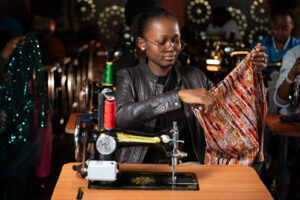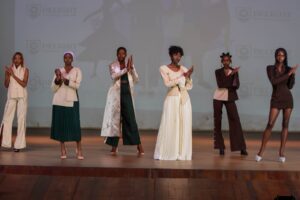
👗 African Fashion Training: Why Students Are Choosing Nairobi
Nairobi, often referred to as the “Fashion Capital of East Africa”, has become an increasingly popular destination for fashion students from across Africa and beyond. With its unique blend of traditional African styles and modern fashion innovations, the city is at the forefront of fashion education in the continent. Here’s why Nairobi has become a top choice for students seeking to pursue African fashion training.
🌍 1. A Rich Cultural Heritage Inspiring Unique Fashion
Nairobi’s location in the heart of East Africa, surrounded by a rich cultural tapestry, plays a significant role in shaping the continent’s fashion industry. Fashion students in Nairobi have the unique opportunity to explore and embrace African heritage through various art forms, traditional fabrics, and diverse indigenous techniques.
- Fusion of Tradition and Innovation: Students learn how to incorporate traditional African textiles (such as kitenge, kanga, ankara, and shweshwe) into contemporary designs, merging Africa’s rich cultural heritage with global fashion trends.
- Hands-On Experience with Artisans: Nairobi is home to local artisans and designers who work with traditional fabrics and sewing techniques, giving students practical insight into African craftsmanship.
Why It’s Important: This rich cultural immersion and access to indigenous skills give students a deeper appreciation of African fashion and the tools needed to design unique collections that blend culture and modern aesthetics.
📚 2. Access to Renowned Fashion Institutions and Training Centers
Nairobi boasts several prestigious fashion schools and training centers, providing students with high-quality education in design, garment production, and fashion entrepreneurship. Some of the well-known institutions offering African fashion training include:
- Fashion Design Schools: Institutions like The Nairobi Fashion Academy, Jomo Kenyatta University of Agriculture and Technology (JKUAT), and Kenya Fashion Week Academy offer specialized programs in fashion design, textile development, fashion marketing, and business management.
- International Partnerships: Many of these institutions have partnerships with international fashion schools and organizations, offering students global exposure and the opportunity to engage with fashion leaders from all over the world.
Why It’s Important: With top-tier educational institutions and access to cutting-edge fashion resources, students are equipped with both the theoretical knowledge and practical skills necessary to succeed in the dynamic fashion industry.
💡 3. A Thriving Fashion Industry with Global Recognition
The fashion industry in Nairobi is rapidly growing and is recognized as a hub for creativity and entrepreneurship. International fashion houses and brands are increasingly looking to Africa for fresh ideas, and Nairobi is a gateway to this global recognition.
- Fashion Events and Festivals: Nairobi hosts major fashion events such as Nairobi Fashion Week, Swahili Fashion Week, and Kenya Fashion Awards, where students can showcase their designs and network with established designers and brands.
- Local Fashion Startups: Many Nairobi-based designers are making a mark in the global fashion scene, thanks to the city’s growing fashion ecosystem, which includes opportunities for mentorship, exposure, and funding.
Why It’s Important: For fashion students, being in Nairobi means being at the heart of Africa’s booming fashion scene, where they can showcase their talents, engage with industry leaders, and build connections that open doors to global opportunities.
🌱 4. Focus on Sustainable Fashion
Sustainability has become a critical issue in the fashion industry, and Nairobi is emerging as a center for sustainable fashion in Africa. Fashion students in Nairobi have the opportunity to learn about eco-friendly materials, ethical production methods, and socially responsible design.
- Eco-Friendly Materials: Students are trained in using recycled materials, organic fabrics, and locally sourced textiles, promoting environmentally conscious design practices.
- Empowering Local Communities: Many fashion initiatives in Nairobi focus on empowering artisans, supporting local economies, and ensuring that designers work within fair-trade systems.
Why It’s Important: With sustainability becoming a key driver in global fashion, students in Nairobi are learning how to create fashion that not only aligns with African traditions but also meets the ethical and environmental standards demanded by global consumers.
🤝 5. Networking and Collaboration Opportunities
Nairobi is home to a vibrant fashion community where students, professionals, and entrepreneurs come together to share knowledge and collaborate on projects. This collaborative environment offers valuable networking opportunities for fashion students.
- Collaborative Fashion Projects: Nairobi-based students often work on joint projects with established designers, fashion houses, and local brands. This hands-on experience helps students build a portfolio and gain industry exposure.
- Mentorship: Students benefit from mentorship by renowned local and international fashion designers, who guide them through their education and help them grow their careers.
Why It’s Important: Through these networking opportunities and mentorship programs, students gain not just education but also a support system that can propel their careers and help them tap into Africa’s rapidly evolving fashion industry.
🌍 6. Nairobi’s Strategic Position as a Regional Fashion Hub
As East Africa’s fashion capital, Nairobi is strategically positioned to serve as a launchpad for students aiming to break into the regional or continental market. The city’s growing influence within the African fashion scene offers students a unique advantage when it comes to market access and regional collaborations.
- Proximity to Key Fashion Markets: Nairobi is a gateway to the East African market, making it easier for students to enter into neighboring countries like Uganda, Tanzania, and Rwanda, where demand for African-inspired fashion is growing rapidly.
- Trade Networks: Nairobi’s location is central to the East African Community (EAC), offering students access to cross-border trade and regional partnerships that can further their fashion careers.
Why It’s Important: For students looking to expand their reach beyond their home country, Nairobi provides the perfect location to build a regional presence and grow their influence across Africa.
👠 7. Entrepreneurial Spirit and Fashion Business Opportunities
Nairobi is a city brimming with entrepreneurial energy, especially in the fashion sector. Many fashion students choose Nairobi not only for its training programs but also for the business opportunities available to budding entrepreneurs.
- Support for Fashion Startups: Nairobi offers fashion incubators, start-up grants, and business networking events that help young designers turn their creative ideas into successful ventures.
- Fashion Business Education: Alongside design training, fashion schools in Nairobi also offer business courses in fashion entrepreneurship, helping students learn how to run their own fashion labels and navigate the business side of the industry.
Why It’s Important: Nairobi’s entrepreneurial culture combined with fashion business education gives students the tools they need to start their own fashion businesses and take on leadership roles within the fashion industry.
✅ Conclusion: Nairobi – The Ideal Destination for Aspiring Fashion Designers
Nairobi is not just a city of style and creativity—it’s a thriving fashion education hub that offers a unique combination of cultural heritage, fashion innovation, and business opportunities. Whether you’re passionate about traditional African textiles, sustainable fashion, or building your own fashion brand, Nairobi offers the resources, networking, and inspiration you need to thrive in the competitive fashion world.
Choosing to study fashion in Nairobi means being part of a dynamic, ever-growing community where education, culture, and entrepreneurship meet, preparing you for a successful career in the exciting and evolving African fashion industry.



